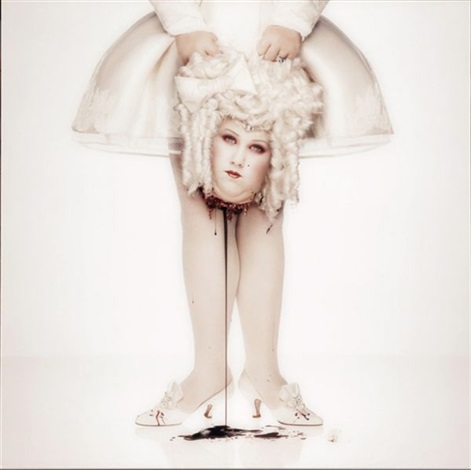Few people has been subjected to such intense public anger and dehumanization as Marie Antoinette - even after her death. The story of her mistreatment and eventual death is well-known but the ire of public imagination has not subsided over the years. The revolutionary (and pre-revolutionary) propaganda was immensely successful and has largely shaped the way we still perceive the ill-fated queen.
However, whereas Marie Antoinette's image is used on a variety of consumer products such as hair brushes, perfumes and even cakes, the darker side is the continual usage of her tragic demise. As late as July 2024, the Paris Olympics used graphic imagery of a beheaded Marie Antoinette holding her own head (singing for good measure) in her arms, for the opening ceremony. To make matters even more macabre, the imagery was depicted from the windows of the Conciergerie - the prison in which she spent her last days.
 |
| Marie Antoinette, as depicted during the opening ceremony of the Olympics, 2024 |
Alas, the only person to have her stand-in corpse utilized in this graphic manner was Marie Antoinette. One might wonder why there was no headless Louis XVI peeking out from the windows, especially considering that he not only held the actual political power but was the only one of the two who represented the hated Bourbon-dynasty. The two could have been joined by a slightly shorter-than-life Robespierre.
Instead, Marie Antoinette remained the sole symbol of the fall of the French monarchy - she remain the scapegoat of an entire outdated system which had become a hallmark of inequality and exploitation, despite having had no direct political power nor having even been born into the reigning dynasty.
The tradition of using Marie Antoinette for commercial gains is nothing new. Countless Halloween-costumes allow trick-and-treaters to don bloodied court dresses for a night out. Some even offer tricks to "decapitate yourself" a la Marie Antoinette or include necklaces to make it seem as if the head has been reattached. For those who wish to have a more lasting souvenir, it is possible to purchase posters - naturally, with the queen sans tête.
In an Avantgarde photo exhibition by Erwin Olaf from 2000, the artist took inspiration from royal tragedies. His exhibition "Royal Blood" contained numerous references to very real tragedies - a Jackie Kennedy, first pristine in white with her signature hat, then splattered with (her husband's) blood, a very Princess Diana-looking model with a deep cut into her arm - and Marie Antoinette, holding her own head, yet again.
 |
| Erwin Olaf's Marie Antoinette |
In fairness to Olaf, he is far from the only one who saw fit to use the ci-devant queen's decapitated head as a prop. The Long Island City's Sculpture Centre once exhibited a "Banquet of the Beheaded" with Marie Antoinette's (and others') heads served on actual platters.
 |
| From the Banquet of the Beheaded |
One of the more disturbing aspects of the exploitation of her death has been by toy makers. The company Archie McPhee & Co has carried several items which can be categorised as downright disrespectful. For one, there was the lollypop shaped as the head of the beheaded queen, ripe for consumption. Another addition was the action figure which might seem innocent enough with its accompanying court gown/peasant gown accessories. One might wonder why the company felt the need to install a clicker which makes the doll's head fly off its shoulders.
 |
| Toy by Archie McPhee & Co |
One enthusiastic buyer of the toy amusedly commented: "My friends, students, and family have so enjoyed playing with our Marie-Antoinette that her plastic head socket has gotten a bit out of joint. Thus my question: how, oh how, will I ever get the queen’s head back on her shoulders?!"
Even the small-business owners on Etsy have gotten in on the fun. It is possible to purchase dolls of both Marie Antoinette and Louis XVI with their heads cut off and a clear view of their severed throats. Another seller outright sells the queen's decapitated head - replica, naturally, but complete with a bloody neckline and eyes rolling back. The latter has already been sold and is thus adorning someone's home or perhaps served as a Halloween prop.
 |
| Doll head from Etsy |

It is tempting to wonder what it is, exactly, about the very beheading that keeps people amused. All the usages of the queen mentioned in this post have been focused on the removal of her head, whether through images or by allowing the customer to wring off the head themselves. Perhaps the idea of beheading her again and again simply have an irresistible appeal? A perpetual punishment?
While the depiction of the bad side of royalty has always been popular - and still is - there is a marked difference between plastering the profile of a coiffured Marie Antoinette on a pastel-colored umbrella and using the decapitated, blood-dripping head of the queen for dramatic or even amusing effect.
When dealing with historical figures, it is all too easy to forget that they were actual people once. While Marie Antoinette herself certainly had flaws, it is hard to argue that she still - 231 years after her death - merit having her gruesome end (body and head) utilized in this manner.

No comments:
Post a Comment